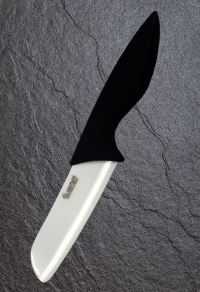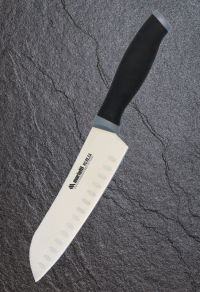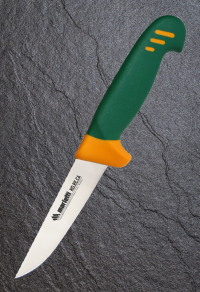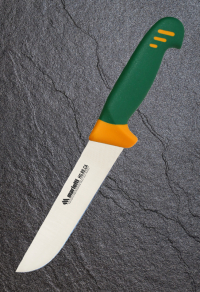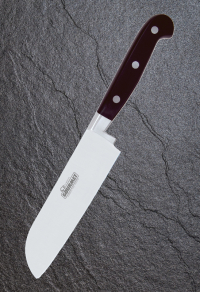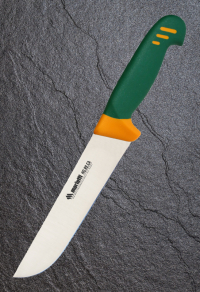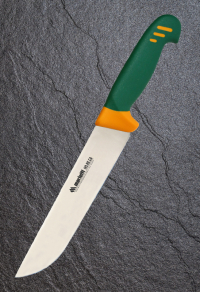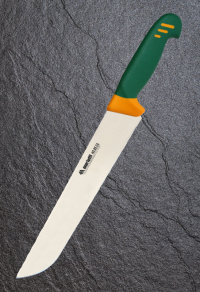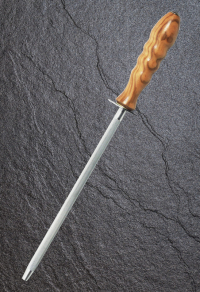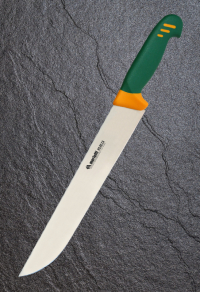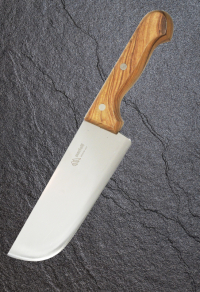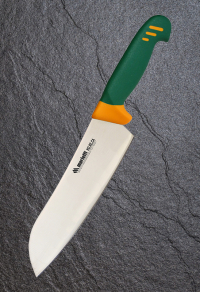Home
Subcategories
-
Knife SANTOKU - cod. 134CZ
The Santoku knife represents the Japanese equivalent of the European chef's knife (CHEF KNIFE). Characteristic Japanese knife used to cut and chop vegetables. For this operation - in fact - Western cooks use the knife called CHEF KNIFE The big difference between the two blades is that the carving knife is designed so that the tip always remains in contact with the cutting board, while the Santoku is used as a small cleaver and the tip always comes off the cutting board. -
Knife SANTOKU 1235TP
A Santoku has a blade quite similar to a carving knife and is the Japanese equivalent of a chef's knife. Since it is a good idea to have a knife (and a cutting board) for raw food and a knife (and a cutting board) for cooked foods, the second carving knife can be a Santoku so you have the chance to try this type of blade too. The big difference between the two blades is that the carving knife is designed so that the tip always remains in contact with the cutting board, while the Santoku is used as a small cleaver and the tip always comes off the cutting board.
-
Knife FRANCESE 13 BUT13
Knife with a large and heavy blade, generally having a length between 15 and 30 cm with a specific curvature - near the tip - that allows precise cuts to be obtained. Used to cut all types of red meat. -
Knife FRANCESE 16 BUT16
Knife with a large and heavy blade, generally having a length between 15 and 30 cm with a specific curvature - near the tip - that allows precise cuts to be obtained. Used to cut all types of red meat. -
Knife SANTOKU - cod. 2016
The Santoku knife represents the Japanese equivalent of the European chef's knife (CHEF KNIFE). Characteristic Japanese knife used to cut and chop vegetables. For this operation - in fact - Western cooks use the knife called CHEF KNIFE The big difference between the two blades is that the carving knife is designed so that the tip always remains in contact with the cutting board, while the Santoku is used as a small cleaver and the tip always comes off the cutting board.
-
Knife FRANCESE 18 BUT18
Knife with a large and heavy blade, generally having a length between 15 and 30 cm with a specific curvature - near the tip - that allows precise cuts to be obtained. Used to cut all types of red meat. -
Knife FRANCESE 21 BUT21
Knife with a large and heavy blade, generally having a length between 15 and 30 cm with a specific curvature - near the tip - that allows precise cuts to be obtained. Used to cut all types of red meat. -
Knife FRANCESE 26 BUT26
Knife with a large and heavy blade, generally having a length between 15 and 30 cm with a specific curvature - near the tip - that allows precise cuts to be obtained. Used to cut all types of red meat.
-
ACCIAINO
Special accessory for sharpening knives with small / medium length blade. Handle in non-slip material. Sharpening the edges of the blade before each use is needed to prolong the life of the knives. -
Knife FRANCESE 31 BUT31
Knife with a large and heavy blade, generally having a length between 15 and 30 cm with a specific curvature - near the tip - that allows precise cuts to be obtained. Used to cut all types of red meat. -
Knife PESTO
Butcher knives have large and heavy but also very sharp blades. They are also generally used as chippings, but they are also very useful for cutting meat slices and pieces. -
Knife SANTOKU 18 STK18
The Santoku knife represents the Japanese equivalent of the European chef's knife (CHEF KNIFE). Characteristic Japanese knife used to cut and chop vegetables. For this operation - in fact - Western cooks use the knife called CHEF KNIFE The big difference between the two blades is that the carving knife is designed so that the tip always remains in contact with the cutting board, while the Santoku is used as a small cleaver and the tip always comes off the cutting board.


